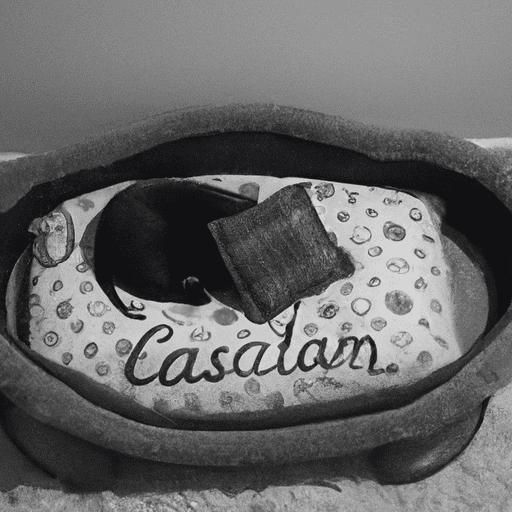Losing a beloved cat can be an incredibly difficult experience, as they are not just pets but cherished members of our families. In this article, we will explore the different emotions that may arise when coping with the loss of a cat, and provide suggestions on how to navigate the grieving process. From acknowledging the pain and finding solace in memories, to seeking support from friends and family, we hope to offer guidance and healing for those who are mourning the loss of their feline companion.
Understanding Grief after Losing a Beloved Cat
Losing a beloved cat can be a deeply heartbreaking experience. As a cat owner, it is important to recognize and acknowledge the grief that follows such a loss. Grief is a natural emotional response to losing a loved one, including a cherished pet. It is essential to understand that grieving for a cat is a valid and important process that allows you to honor the bond you shared and begin the healing journey.
The Importance of Acknowledging and Processing Grief
Acknowledging your grief is the first step towards healing after losing a beloved cat. It is crucial to understand that your feelings of sadness, longing, and even anger are normal and valid. Allow yourself the space to grieve and don’t rush through the process. Grief can be a complex and multifaceted experience, and giving yourself permission to feel and process these emotions is essential for your well-being.
Processing grief involves finding healthy ways to express your emotions. It may be helpful to talk about your cat and your feelings with supportive friends or family members who understand the special bond you had. Consider seeking out support groups or online communities where you can connect with others who have experienced similar losses. Writing in a journal can also be a cathartic way to explore your emotions and memories.
Recognizing the Different Stages of Grief
Grief often manifests in different stages, and understanding these stages can provide insight into the emotions you may experience. The stages of grief, as defined by the renowned psychiatrist Elisabeth Kübler-Ross, are denial, anger, bargaining, depression, and acceptance. It is important to note that these stages are not linear and everyone’s grief journey is unique. You may find yourself cycling through these stages or experiencing them in a different order.
Denial is often the initial reaction to loss, as it can be difficult to accept the reality of your cat’s absence. Anger may follow, directed at yourself, others, or even towards your cat for leaving you. Bargaining involves feelings of guilt and the desire to turn back time. Depression is a common stage of grief, characterized by a deep sadness and a loss of interest in activities. Finally, acceptance allows you to come to terms with the loss and find a sense of peace.
Cultural and Individual Variations in Grieving Processes
Grief is a deeply personal experience, and the way individuals grieve can vary greatly depending on cultural and individual factors. Different cultures have diverse rituals and practices surrounding pet loss. Some cultures may hold memorial ceremonies, while others may find comfort in private rituals. Understanding and respecting your own cultural background and beliefs can provide a framework for your grieving process.
Individual differences also play a significant role in how we grieve. Everyone has their own unique way of coping with loss, and it is important to honor and respect your own grieving style. Some individuals may seek solace in introspection and solitude, while others may find comfort in social connections and companionship. Remember that there is no right or wrong way to grieve, and following your own path is key to finding healing and peace.
Honoring Your Beloved Cat’s Memory
As you navigate the grieving process, finding ways to honor and remember your beloved cat can be a meaningful part of the healing journey. Honoring their memory allows you to cherish the special bond you shared and keep their spirit alive.
Creating a Memorial or Tribute for Your Cat
Creating a memorial or tribute for your cat can be a deeply personal and healing experience. Consider dedicating a special space or corner in your home where you can display their favorite toys, pictures, or even their collar. You may also choose to create a memorial garden with flowers or plants that hold significance. This tangible tribute can serve as a place of solace and reflection as you remember your furry companion.
Displaying Photos and Keepsakes
Displaying photos and keepsakes of your beloved cat can be a comforting way to keep their memory alive. Choose a few of your favorite pictures that capture their unique personality and create a photo album or a collage. You can also select a special keepsake, such as a customized necklace or a framed paw print, that holds a physical connection to your cat. These visual reminders can bring comfort and evoke joyful memories of the time you shared together.
Writing a Eulogy or Obituary
Writing a eulogy or obituary for your beloved cat can be a beautiful way to express your love and gratitude for their presence in your life. Reflect on their unique qualities, funny quirks, and the special moments you shared. Share your eulogy or obituary with close friends and family members, or consider posting it on a dedicated pet loss forum or online community. This act of writing and sharing your feelings can provide a sense of closure and allow others to understand the significance of your cat’s life.
Planning a Farewell Ritual or Ceremony
Planning a farewell ritual or ceremony can be a meaningful way to say goodbye to your beloved cat. Consider gathering loved ones and organizing a small ceremony to honor their life and the love they brought into your world. You may choose to share stories, read poems, or play music that holds meaning for you and your cat. Lighting a candle or releasing a balloon can symbolize the release of your cat’s spirit. This ritual can provide a sense of closure and allow you to say a final goodbye in your own way.
Finding Support during the Grieving Process
Grieving the loss of a beloved cat can be an incredibly challenging experience, and finding support is crucial for healing and coping with your emotions. Seeking emotional support from loved ones, connecting with online communities, or consulting with a grief counselor or therapist can provide much-needed comfort and guidance.
The Value of Seeking Emotional Support from Loved Ones or a Support Group
Reaching out to friends and family members who understand the depth of your grief can provide invaluable emotional support during this difficult time. Share your memories, fears, and feelings with them, knowing that they are there to listen and offer comfort. If you prefer a more structured support system, consider joining a pet loss support group in your community or online. These groups provide a safe space to connect with others who have experienced similar losses, and sharing your stories and feelings can be therapeutic.
Online Communities and Forums for Pet Loss
The internet offers a wealth of resources and online communities dedicated to pet loss and grieving. Joining these communities can provide a sense of belonging and understanding, as fellow members have firsthand knowledge of what you are going through. Online forums allow you to share your experiences, ask questions, and offer support to others who are grieving the loss of a beloved pet. Engaging with these communities can be a source of comfort and a reminder that you are not alone.
Consulting with a Grief Counselor or Therapist
If you find that your grief is overwhelming or difficult to cope with, seeking professional help can be beneficial. Grief counselors or therapists trained in pet loss can provide a safe and non-judgmental space for you to express your emotions and navigate the complexities of grief. They can offer guidance on healthy coping mechanisms, provide validation for your feelings, and help you develop strategies to move forward in your healing journey. Remember, seeking professional help is a sign of strength and self-care.
Taking Care of Yourself in Times of Grief
When grieving the loss of a beloved cat, it is essential to prioritize self-care and tend to your physical and mental health. Grief can take a toll on both aspects of your well-being, and practicing healthy coping mechanisms can aid in the healing process.
Understanding the Impact of Grief on Physical and Mental Health
Grief can manifest both emotionally and physically, affecting your overall well-being. It is important to be aware of the potential physical symptoms of grief, such as changes in appetite, disrupted sleep patterns, fatigue, or headaches. These symptoms are a natural response to loss and can vary in intensity and duration. Grief may also impact your mental health, leading to feelings of anxiety, depression, or difficulty concentrating. Recognizing how grief can affect your physical and mental health is the first step in taking care of yourself.
Prioritizing Self-Care and Practicing Healthy Coping Mechanisms
During times of grief, self-care becomes even more crucial. Engage in activities that bring you comfort and joy, such as spending time in nature, reading, or pursuing hobbies that bring you solace. Allow yourself to grieve without judgment or pressure, and give yourself permission to take breaks when needed. Practicing healthy coping mechanisms, such as exercise, mindfulness, or journaling, can help alleviate stress and facilitate the healing process. Remember to be kind to yourself and prioritize your well-being in this challenging time.
Engaging in Relaxation Techniques and Activities
Relaxation techniques and activities can provide a sense of calm and aid in managing overwhelming emotions during times of grief. Meditation, deep breathing exercises, or practicing yoga can help reduce stress and promote a sense of inner peace. Engaging in activities that promote relaxation, such as taking soothing baths, listening to calming music, or exploring art therapy, can also be soothing and therapeutic. Find what works best for you and make time for these practices as part of your self-care routine.
Dealing with the Practical Aspects of Pet Loss
While grieving the loss of a beloved cat, there are also practical matters that need to be addressed. Handling end-of-life decisions, navigating the process of euthanasia, arranging for the final disposition of your cat’s remains, and updating legal and administrative matters are all part of dealing with the practical aspects of pet loss.
Handling End-of-Life Decisions
When your beloved cat’s health deteriorates, you may find yourself faced with difficult end-of-life decisions. Consult with your veterinarian to evaluate your cat’s quality of life and discuss options such as palliative care or euthanasia. While making these decisions can be extremely challenging, remember that you are acting in the best interest of your cat and ensuring their well-being.
Navigating the Process of Euthanasia
Euthanasia is a humane option for relieving suffering in terminally ill or severely injured cats. It involves administering a carefully planned and painless procedure to euthanize your cat. If you choose euthanasia for your beloved cat, ensure the process is carried out by a compassionate and experienced veterinarian. Take the time to ask any questions you may have and discuss aftercare options, such as home burial or cremation.
Arranging for the Final Disposition of Your Cat’s Remains
After the loss of a cat, deciding on the final disposition of their remains is a personal choice. Some individuals prefer home burial, providing a peaceful resting place in familiar surroundings. Alternatively, cremation allows for the preservation of your cat’s ashes. You may choose to keep the ashes in a decorative urn or scatter them in a place that held significance for both you and your cat. Whatever option you choose, it should reflect the love and attachment you had for your beloved cat.
Updating Legal and Administrative Matters
During the grieving process, it is essential to update legal and administrative matters related to your cat’s loss. Inform your veterinarian and any pet insurance providers to prevent potentially distressing reminders. Update your cat’s information with any relevant registries or microchip companies. If your cat’s passing affects legal matters, such as wills, trusts, or pet custody arrangements, consult with your attorney to ensure any necessary updates are made. Taking care of these practical aspects allows you to focus more fully on your healing journey.
Supporting Children and Other Pets through the Loss
The loss of a beloved cat affects not only the immediate family but also other pets and children in the household. Providing support to children and other pets during this time can help them navigate their own grieving process.
Understanding Children’s Grief and Helping Them Cope
Children experience grief differently from adults, and it is important to support them through this difficult time. Be honest and age-appropriate when discussing the loss of their beloved cat, using language they can understand. Encourage them to express their emotions through drawing, storytelling, or other creative outlets. Maintain a routine, as it provides a sense of stability and security. Be patient and understanding as children may grieve in their own unique ways, which can include regressions or behavioral changes. Reassure them that their feelings are valid and that it’s okay to miss their furry friend.
Communicating Honestly and Answering Questions
Children may have many questions about the loss of their beloved cat. Be open and honest about what happened, using age-appropriate language and explanations. Answer their questions as honestly as possible, demonstrating empathy and understanding. Keep in mind that children may ask the same questions repeatedly as a way of processing their grief. Encourage them to share their memories and feelings about their cat, as it helps them make sense of their emotions and offers an opportunity for connection.
Supporting Other Pets in the Household
Pets in a multi-pet household can also experience grief and loss when a companion cat passes away. Keep a close eye on their behavior, as changes in eating habits, sleep patterns, or social interactions can signify distress. Provide extra love and attention to your surviving pets, as they may find comfort in human companionship. Gradually reestablish routines and engage in activities that promote bonding and positive interactions. If necessary, consult with a veterinarian or animal behaviorist for guidance on supporting your surviving pets through their grief.
Monitoring Changes in Behavior
The loss of a beloved cat can significantly impact the behavior of children and other pets in the household. Keep a watchful eye for any significant changes in behavior, such as withdrawal, aggression, or changes in eating and sleeping habits. While these changes are normal as part of the grieving process, they should not persist indefinitely. If you notice prolonged or concerning behavior changes in children or other pets, consider seeking professional help from a counselor, therapist, or veterinarian to ensure their well-being.
Grieving the Loss of a Cat in a Multi-Pet Household
In a multi-pet household, the dynamics of grief can become more complex. Each pet may respond differently to the loss, and promoting bonding and comfort among the surviving pets is crucial.
The Dynamics of Grief in Multi-Pet Families
When a beloved cat passes away in a multi-pet household, the surviving pets can experience a range of emotions and behaviors. Some pets may display signs of grief, such as searching for the lost companion or exhibiting changes in appetite or sleep patterns. Others may seem indifferent, as cats are known for their ability to mask their emotions. Recognize that each pet will grieve in their own unique way, and be sensitive to their individual needs during this difficult time.
Promoting Bonding and Comfort among the Surviving Pets
Promoting bonding and comfort among the surviving pets can provide solace and companionship during their grieving process. Ensure that each pet receives individual attention and affection, as they may have different needs for comfort. Encourage positive interactions, such as gentle play or shared meal times, to facilitate a sense of connection. You can also provide them with an item that carries the scent of the deceased cat, such as a blanket or bedding, to offer familiarity and comfort. By nurturing these bonds, you can help all your pets find solace and support in their grief.
Allowing Pets to Grieve and Express Their Emotions
Pets, just like humans, need time and space to grieve and express their emotions. Allow your surviving pets the opportunity to mourn in their own way. They may spend more time seeking out the cat’s favorite spots or exhibit changes in behavior that reflect their grief. Provide them with a calm and safe environment to grieve, ensuring they have access to their usual comforts, such as their favorite toys or hiding spots. Be patient and understanding, allowing them to find their own pace in healing.
Finding Meaning and Healing after Pet Loss
While the pain of losing a beloved cat may never fully disappear, finding meaning and healing is possible. Engaging in activities that bring comfort and joy, exploring rituals and ceremonies for closure, considering pet adoption or fostering, and honoring your cat’s legacy through donations or volunteer work are all ways to find meaning and healing after pet loss.
Engaging in Activities that Bring Comfort and Joy
Engaging in activities that bring comfort and joy can be a powerful way to cope with grief and honor your beloved cat’s memory. Whether it’s spending time in nature, pursuing hobbies you love, or simply taking quiet moments of reflection, finding solace in activities that nurture your soul is healing. Experiment with different activities and recognize that what brings comfort may change over time. By intentionally seeking out what brings you joy, you can find moments of peace and connection with your cat’s memory.
Exploring Rituals and Ceremonies for Closure
Rituals and ceremonies can provide closure and comfort after the loss of a beloved cat. These rituals can be tailored to reflect your personal beliefs and the unique bond you shared with your cat. Lighting a candle, creating a memory box, or writing a letter to your cat can be a way to say goodbye and express your emotions. Consider consulting with a pet loss specialist or researching different cultural practices to find rituals that resonate with you. These ceremonies can offer closure, allowing you to honor your cat’s life and find a sense of peace in their memory.
Considering Pet Adoption or Fostering
While no pet can replace the one you lost, considering pet adoption or fostering can help bring healing and a renewed sense of purpose. Opening your heart to another animal in need allows you to provide a loving home and continue the legacy of compassion that your beloved cat inspired. Take the time to determine when you are emotionally ready to welcome a new furry companion into your life. Remember, there is no timeline for grief, and each person’s healing journey is unique. When the time is right, consider giving another pet the chance for a loving home.
Honoring Your Cat’s Legacy through Donations or Volunteer Work
Honoring your cat’s legacy by donating to animal welfare organizations or engaging in volunteer work can be a meaningful way to channel your grief into positive action. Consider supporting causes that held significance to your cat, such as local animal shelters or organizations that promote pet health and well-being. By making a difference in the lives of other animals, you can honor the love and companionship your cat brought into your life. This act of giving can provide a sense of purpose and contribute to your healing journey.
Dealing with Triggers and Anniversaries
Triggers and anniversaries can bring waves of grief, even after some time has passed. Recognizing and managing these triggers, as well as coping with anniversaries and special occasions, is an essential part of the healing process.
Recognizing and Managing Triggers of Grief
Triggers of grief can arise unexpectedly, reminding you of the loss and triggering a wave of intense emotions. These triggers can include visual cues, such as encountering a cat that resembles your beloved companion, or encountering familiar scents or sounds associated with your cat. Recognizing these triggers is the first step in managing them. It can be helpful to develop personal coping strategies, such as deep breathing exercises or mindfulness techniques, to help regulate your emotions when triggered. Engaging in self-care practices and seeking support from loved ones during these times can also offer comfort.
Coping with Anniversaries and Special Occasions
Anniversaries and special occasions, such as your cat’s birthday or the anniversary of their passing, can be particularly challenging while grieving. These dates can evoke a range of emotions, from sadness to nostalgia. It is important to anticipate these occasions and plan ahead for how you will cope. Allow yourself the space to honor your cat’s memory by engaging in special rituals or activities that hold meaning to you. Reach out to loved ones or support groups for additional support during these times, as they can offer understanding and companionship.
When to Seek Professional Help
While grief is a normal part of the healing process, there are instances where professional help may be necessary. Identifying complicated grief and prolonged mourning, recognizing signs of depression or anxiety, and seeking help from mental health professionals are all vital aspects of taking care of your emotional well-being.
Identifying Complicated Grief and Prolonged Mourning
Complicated grief, also known as prolonged grief disorder, occurs when the grieving process becomes prolonged and intense, significantly interfering with everyday life. Symptoms of complicated grief may include an inability to accept the loss, persistent feelings of intense sadness or emptiness, a sense of detachment from others, or an inability to engage in normal activities. If you find that your grief is debilitating or if it persists for an extended period, consider seeking professional help from a mental health professional who specializes in grief counseling.
Recognizing Signs of Depression or Anxiety
The loss of a beloved cat can trigger or worsen symptoms of depression or anxiety in some individuals. If you experience persistent feelings of sadness, hopelessness, irritability, changes in appetite or sleep, or sudden panic attacks, it may be indicative of a more significant mental health concern. Recognizing these signs and seeking help is important for your overall well-being. Reach out to a mental health professional who can assess your symptoms and provide appropriate treatment or support.
Seeking Help from Mental Health Professionals
If you find that your grief is overwhelming, interfering with your daily life, or impacting your physical or mental health, it may be necessary to seek help from mental health professionals. Grief counselors, therapists, or psychologists trained in pet loss and bereavement can provide guidance and support through your healing journey. They can help you navigate the complexities of grief, develop coping strategies, and assist in working through any underlying issues that may be intensifying your grief. Remember, seeking professional help is a sign of strength and a crucial step in finding healing and peace.
In conclusion, the loss of a beloved cat is a profound and deeply emotional experience. Understanding and acknowledging the grief that follows, as well as finding healthy ways to cope and heal, is crucial for your well-being. By honoring your cat’s memory, seeking support, taking care of yourself, addressing practical matters, and finding meaning and healing, you can navigate this difficult time and ultimately find solace in the memories and love you shared. Remember, you are not alone in your grief, and with time and support, healing is possible.








